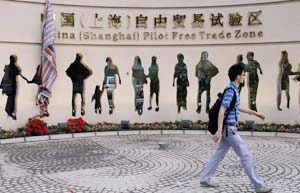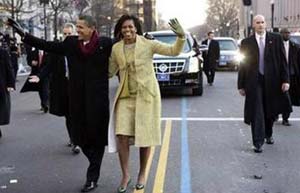

At the forum, some commerce officials from the GCC countries also expressed their views on bilateral trade between China and Arab states. "By 2015, 55 percent of energy consumed by China will come from the Gulf region, and China will overtake India to become the UAE's largest trading partner, when trade between the two countries will reach $60 billion," said Abdullah Saleh, the UAE's Vice Minister of the Economy. According to Saleh, the free trade agreement between China and the GCC is likely to be signed by both sides between October and December this year and he thinks bilateral trade will get a further boost when more trade agreements are signed in the near future.
In July 2004, China and the GCC announced the launch of free trade agreement negotiations. Until now, the two parties had reached agreements on a majority of trade issues. Negotiations on trade in services are also underway.
Ahmed Dheeb, Oman's Vice Minister of Commerce and Industry, says in recent years economic ties between the two countries have remained close and significant increases in trade volume have been witnessed, especially in the oil industry.
"From a long-term perspective, we will also turn our attention to the investment fields of new energy, manufacturing and dry-land farming," said Dheeb, "because we wish to gain an opportunity for sustainable development and are looking for more comprehensive cooperation." The free trade agreement will stimulate companies in the Gulf region to set up petrochemical enterprises in China, which could result in reduced energy prices, he added.
Room for improvement
Jia Guoyong, deputy director of MOFCOM's Trade Development Bureau, said at a forum during the expo that promoting imports will be a priority this year and in the future. During the China-Arab States Expo, commercial representatives from the embassies of Iran, Saudi Arabia, Turkey, Bangladesh and Syria were invited to discuss the export policies and competitive products of their respective countries.
The Bangladesh Government is proposing to establish an industrial zone exclusively for the Chinese investors, said Ruhidas Jodder, Commercial Counselor at the Bangladeshi Embassy in Beijing. All the investors would be Chinese, the investors and investment sectors would be selected by the Chinese side and administration and management of the zone would be conducted by the Chinese. In the special industrial zone, preferential policies will be implemented for importing raw materials and exporting the finished products. Jodder says the Bangladesh Government will also assist in setting up the zone.
Zhang Wei, vice chairman of the China Council for the Promotion of International Trade, said that Islamic countries have rich oil and mineral resources while China has a huge market for them, something that could bring huge advantages to both sides. However, cumbersome trade procedures restrict the potential for further trade between China and the region. An example Zhang cited is tomato sauce. Exporters must go through 960 procedures if they want to export tomato sauce from Xinjiang. "How can trade be facilitated with so many steps in the way?" Zhang said.
Business people also have their troubles. Liu Jun, sales director of Ningxia Malian Trading Co Ltd, a company engaged in the production and sale of dried vegetables, is one of them. The company's major markets include Europe, the United States, Canada and South America, and it has plans to develop the Middle East market. But according to Liu, the company has few channels to get information on clients in the region: There is simply not much client information available on the Internet and there are difficulties landing client catalogues, unlike in Europe.
"The major problem is that communication between Middle Eastern clients and us is not smooth," Liu told Beijing Review.
For Kamyar, the Iranian business woman, visa issues are her problem. Every time she comes to China, she can only get a single-entry visa for 30 days. She wants a one-year visa with multiple entries. Kamyar also suggests that China establish a center catering to Middle-East businessmen who wish to set up shops within China.
 New BMW 5 Li hits Chinese market
New BMW 5 Li hits Chinese market
 China to officially launch Shanghai FTZ on Sept 29
China to officially launch Shanghai FTZ on Sept 29
 Time to get smart
Time to get smart
 Leaders' car picks around the world
Leaders' car picks around the world
 Shining models at 15th Aviation Expo China
Shining models at 15th Aviation Expo China
 2013 Beijing Intl Jewelry Expo kicks off
2013 Beijing Intl Jewelry Expo kicks off
 Microsoft revamps Surface to challenge Apple
Microsoft revamps Surface to challenge Apple
 Highlights of AOPA-China Fly-In air show
Highlights of AOPA-China Fly-In air show